Educational Psychology: Exploring Core Theories and Personal Learning
VerifiedAdded on 2023/01/10
|10
|2883
|83
Essay
AI Summary
This essay delves into the field of educational psychology, examining core theories such as human information processing, behaviorism, and social cognitive theory, and their impact on learning and motivation. The essay highlights the importance of the 'See, Think, Wonder, Connect' task in enhancing observation, interpretation, and introspection skills. It explores the role of attention, memory, and the various types of memory in the learning process. The essay also discusses how personal experiences and environmental factors influence learning and behavior, incorporating concepts like constructivism and the significance of motivation. The author reflects on how these psychological principles have personally influenced their behavior and learning strategies, emphasizing the practical application of educational psychology in daily life and the importance of applying the learned concepts. The essay also touches upon the importance of motivation, its impact on academic performance, and the role of rewards and reinforcements in shaping behavior, concluding with a reflection on how the course content has enhanced their understanding of educational psychology and its relevance to both academic and personal growth.
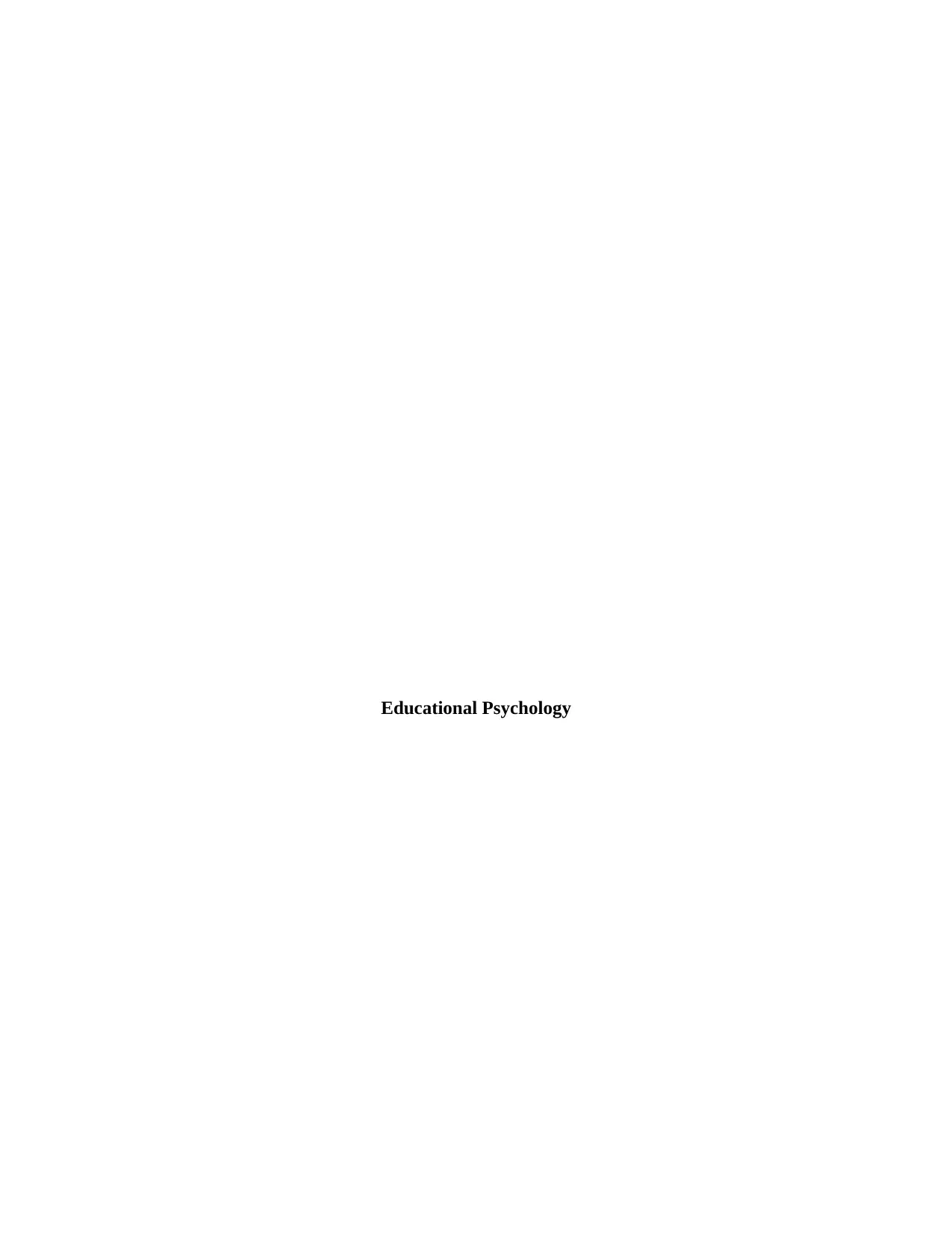
Educational Psychology
Paraphrase This Document
Need a fresh take? Get an instant paraphrase of this document with our AI Paraphraser
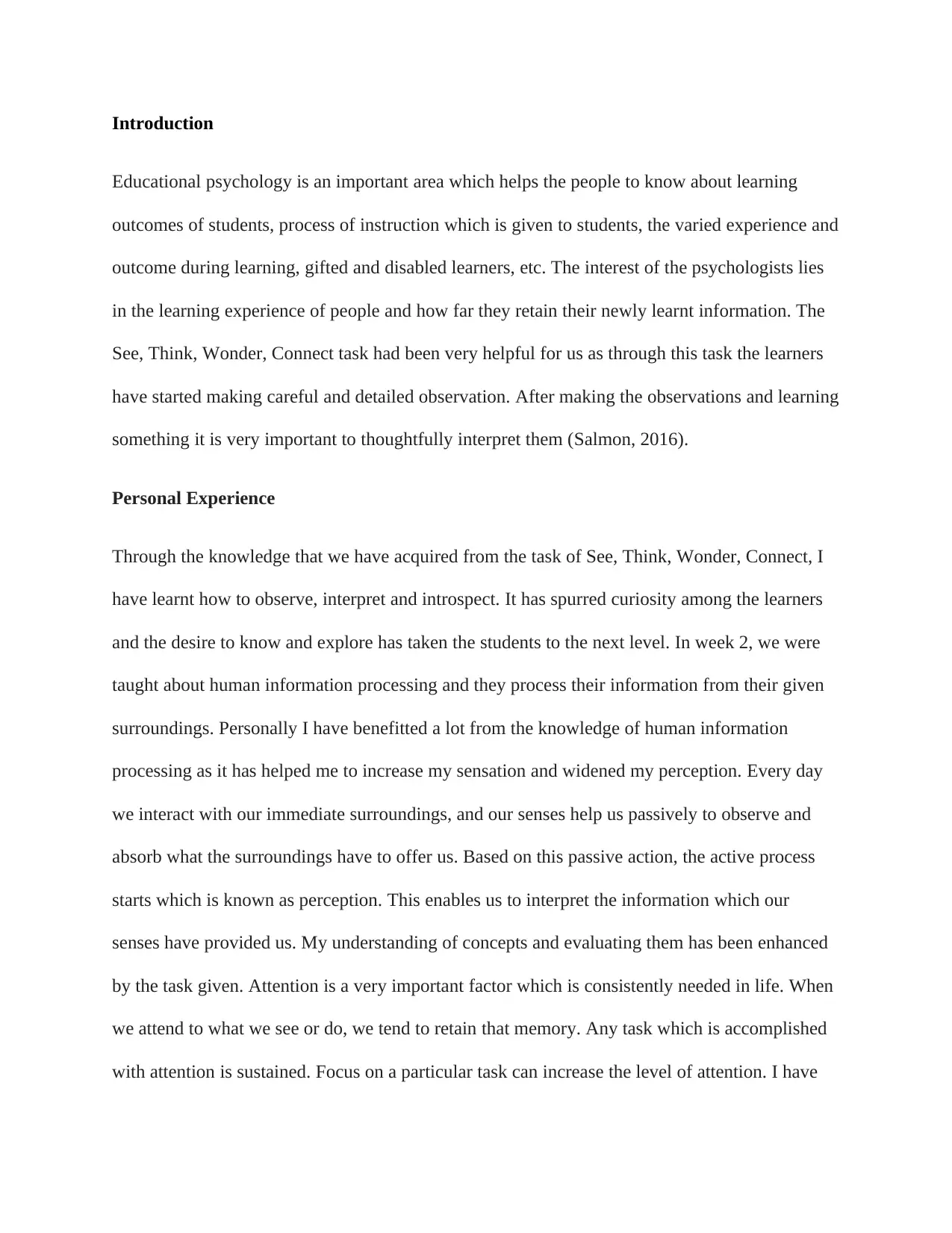
Introduction
Educational psychology is an important area which helps the people to know about learning
outcomes of students, process of instruction which is given to students, the varied experience and
outcome during learning, gifted and disabled learners, etc. The interest of the psychologists lies
in the learning experience of people and how far they retain their newly learnt information. The
See, Think, Wonder, Connect task had been very helpful for us as through this task the learners
have started making careful and detailed observation. After making the observations and learning
something it is very important to thoughtfully interpret them (Salmon, 2016).
Personal Experience
Through the knowledge that we have acquired from the task of See, Think, Wonder, Connect, I
have learnt how to observe, interpret and introspect. It has spurred curiosity among the learners
and the desire to know and explore has taken the students to the next level. In week 2, we were
taught about human information processing and they process their information from their given
surroundings. Personally I have benefitted a lot from the knowledge of human information
processing as it has helped me to increase my sensation and widened my perception. Every day
we interact with our immediate surroundings, and our senses help us passively to observe and
absorb what the surroundings have to offer us. Based on this passive action, the active process
starts which is known as perception. This enables us to interpret the information which our
senses have provided us. My understanding of concepts and evaluating them has been enhanced
by the task given. Attention is a very important factor which is consistently needed in life. When
we attend to what we see or do, we tend to retain that memory. Any task which is accomplished
with attention is sustained. Focus on a particular task can increase the level of attention. I have
Educational psychology is an important area which helps the people to know about learning
outcomes of students, process of instruction which is given to students, the varied experience and
outcome during learning, gifted and disabled learners, etc. The interest of the psychologists lies
in the learning experience of people and how far they retain their newly learnt information. The
See, Think, Wonder, Connect task had been very helpful for us as through this task the learners
have started making careful and detailed observation. After making the observations and learning
something it is very important to thoughtfully interpret them (Salmon, 2016).
Personal Experience
Through the knowledge that we have acquired from the task of See, Think, Wonder, Connect, I
have learnt how to observe, interpret and introspect. It has spurred curiosity among the learners
and the desire to know and explore has taken the students to the next level. In week 2, we were
taught about human information processing and they process their information from their given
surroundings. Personally I have benefitted a lot from the knowledge of human information
processing as it has helped me to increase my sensation and widened my perception. Every day
we interact with our immediate surroundings, and our senses help us passively to observe and
absorb what the surroundings have to offer us. Based on this passive action, the active process
starts which is known as perception. This enables us to interpret the information which our
senses have provided us. My understanding of concepts and evaluating them has been enhanced
by the task given. Attention is a very important factor which is consistently needed in life. When
we attend to what we see or do, we tend to retain that memory. Any task which is accomplished
with attention is sustained. Focus on a particular task can increase the level of attention. I have
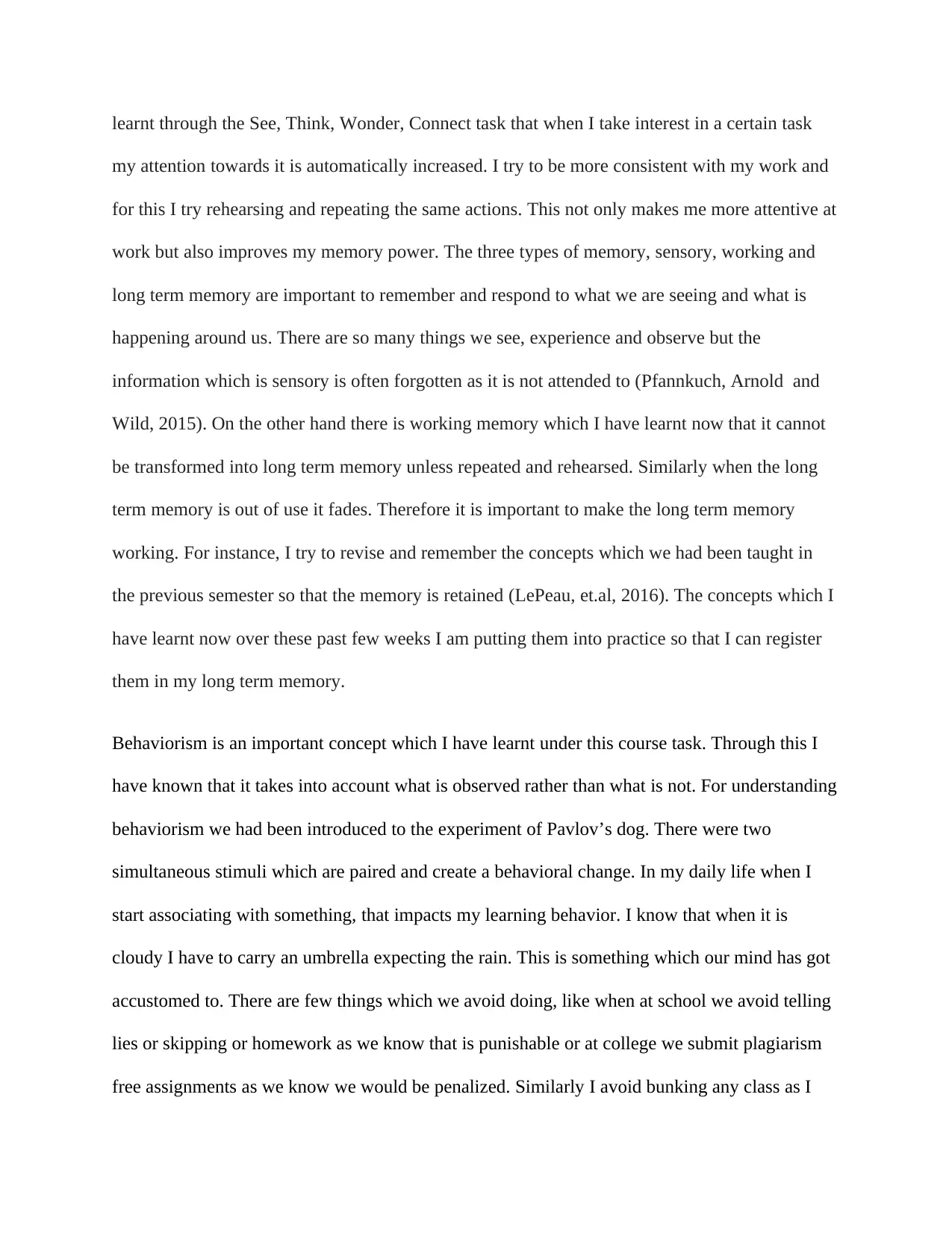
learnt through the See, Think, Wonder, Connect task that when I take interest in a certain task
my attention towards it is automatically increased. I try to be more consistent with my work and
for this I try rehearsing and repeating the same actions. This not only makes me more attentive at
work but also improves my memory power. The three types of memory, sensory, working and
long term memory are important to remember and respond to what we are seeing and what is
happening around us. There are so many things we see, experience and observe but the
information which is sensory is often forgotten as it is not attended to (Pfannkuch, Arnold and
Wild, 2015). On the other hand there is working memory which I have learnt now that it cannot
be transformed into long term memory unless repeated and rehearsed. Similarly when the long
term memory is out of use it fades. Therefore it is important to make the long term memory
working. For instance, I try to revise and remember the concepts which we had been taught in
the previous semester so that the memory is retained (LePeau, et.al, 2016). The concepts which I
have learnt now over these past few weeks I am putting them into practice so that I can register
them in my long term memory.
Behaviorism is an important concept which I have learnt under this course task. Through this I
have known that it takes into account what is observed rather than what is not. For understanding
behaviorism we had been introduced to the experiment of Pavlov’s dog. There were two
simultaneous stimuli which are paired and create a behavioral change. In my daily life when I
start associating with something, that impacts my learning behavior. I know that when it is
cloudy I have to carry an umbrella expecting the rain. This is something which our mind has got
accustomed to. There are few things which we avoid doing, like when at school we avoid telling
lies or skipping or homework as we know that is punishable or at college we submit plagiarism
free assignments as we know we would be penalized. Similarly I avoid bunking any class as I
my attention towards it is automatically increased. I try to be more consistent with my work and
for this I try rehearsing and repeating the same actions. This not only makes me more attentive at
work but also improves my memory power. The three types of memory, sensory, working and
long term memory are important to remember and respond to what we are seeing and what is
happening around us. There are so many things we see, experience and observe but the
information which is sensory is often forgotten as it is not attended to (Pfannkuch, Arnold and
Wild, 2015). On the other hand there is working memory which I have learnt now that it cannot
be transformed into long term memory unless repeated and rehearsed. Similarly when the long
term memory is out of use it fades. Therefore it is important to make the long term memory
working. For instance, I try to revise and remember the concepts which we had been taught in
the previous semester so that the memory is retained (LePeau, et.al, 2016). The concepts which I
have learnt now over these past few weeks I am putting them into practice so that I can register
them in my long term memory.
Behaviorism is an important concept which I have learnt under this course task. Through this I
have known that it takes into account what is observed rather than what is not. For understanding
behaviorism we had been introduced to the experiment of Pavlov’s dog. There were two
simultaneous stimuli which are paired and create a behavioral change. In my daily life when I
start associating with something, that impacts my learning behavior. I know that when it is
cloudy I have to carry an umbrella expecting the rain. This is something which our mind has got
accustomed to. There are few things which we avoid doing, like when at school we avoid telling
lies or skipping or homework as we know that is punishable or at college we submit plagiarism
free assignments as we know we would be penalized. Similarly I avoid bunking any class as I
⊘ This is a preview!⊘
Do you want full access?
Subscribe today to unlock all pages.

Trusted by 1+ million students worldwide
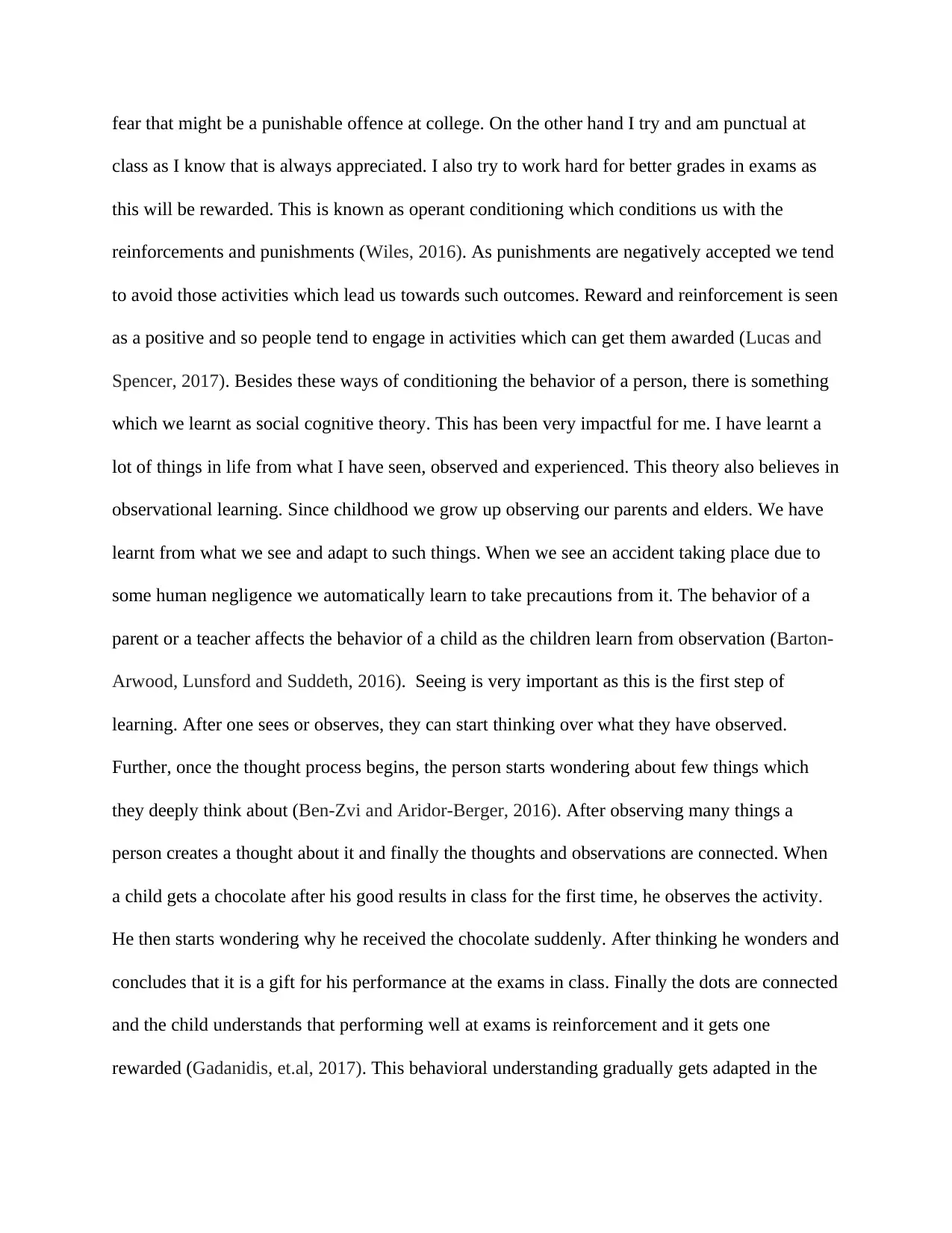
fear that might be a punishable offence at college. On the other hand I try and am punctual at
class as I know that is always appreciated. I also try to work hard for better grades in exams as
this will be rewarded. This is known as operant conditioning which conditions us with the
reinforcements and punishments (Wiles, 2016). As punishments are negatively accepted we tend
to avoid those activities which lead us towards such outcomes. Reward and reinforcement is seen
as a positive and so people tend to engage in activities which can get them awarded (Lucas and
Spencer, 2017). Besides these ways of conditioning the behavior of a person, there is something
which we learnt as social cognitive theory. This has been very impactful for me. I have learnt a
lot of things in life from what I have seen, observed and experienced. This theory also believes in
observational learning. Since childhood we grow up observing our parents and elders. We have
learnt from what we see and adapt to such things. When we see an accident taking place due to
some human negligence we automatically learn to take precautions from it. The behavior of a
parent or a teacher affects the behavior of a child as the children learn from observation (Barton-
Arwood, Lunsford and Suddeth, 2016). Seeing is very important as this is the first step of
learning. After one sees or observes, they can start thinking over what they have observed.
Further, once the thought process begins, the person starts wondering about few things which
they deeply think about (Ben-Zvi and Aridor-Berger, 2016). After observing many things a
person creates a thought about it and finally the thoughts and observations are connected. When
a child gets a chocolate after his good results in class for the first time, he observes the activity.
He then starts wondering why he received the chocolate suddenly. After thinking he wonders and
concludes that it is a gift for his performance at the exams in class. Finally the dots are connected
and the child understands that performing well at exams is reinforcement and it gets one
rewarded (Gadanidis, et.al, 2017). This behavioral understanding gradually gets adapted in the
class as I know that is always appreciated. I also try to work hard for better grades in exams as
this will be rewarded. This is known as operant conditioning which conditions us with the
reinforcements and punishments (Wiles, 2016). As punishments are negatively accepted we tend
to avoid those activities which lead us towards such outcomes. Reward and reinforcement is seen
as a positive and so people tend to engage in activities which can get them awarded (Lucas and
Spencer, 2017). Besides these ways of conditioning the behavior of a person, there is something
which we learnt as social cognitive theory. This has been very impactful for me. I have learnt a
lot of things in life from what I have seen, observed and experienced. This theory also believes in
observational learning. Since childhood we grow up observing our parents and elders. We have
learnt from what we see and adapt to such things. When we see an accident taking place due to
some human negligence we automatically learn to take precautions from it. The behavior of a
parent or a teacher affects the behavior of a child as the children learn from observation (Barton-
Arwood, Lunsford and Suddeth, 2016). Seeing is very important as this is the first step of
learning. After one sees or observes, they can start thinking over what they have observed.
Further, once the thought process begins, the person starts wondering about few things which
they deeply think about (Ben-Zvi and Aridor-Berger, 2016). After observing many things a
person creates a thought about it and finally the thoughts and observations are connected. When
a child gets a chocolate after his good results in class for the first time, he observes the activity.
He then starts wondering why he received the chocolate suddenly. After thinking he wonders and
concludes that it is a gift for his performance at the exams in class. Finally the dots are connected
and the child understands that performing well at exams is reinforcement and it gets one
rewarded (Gadanidis, et.al, 2017). This behavioral understanding gradually gets adapted in the
Paraphrase This Document
Need a fresh take? Get an instant paraphrase of this document with our AI Paraphraser
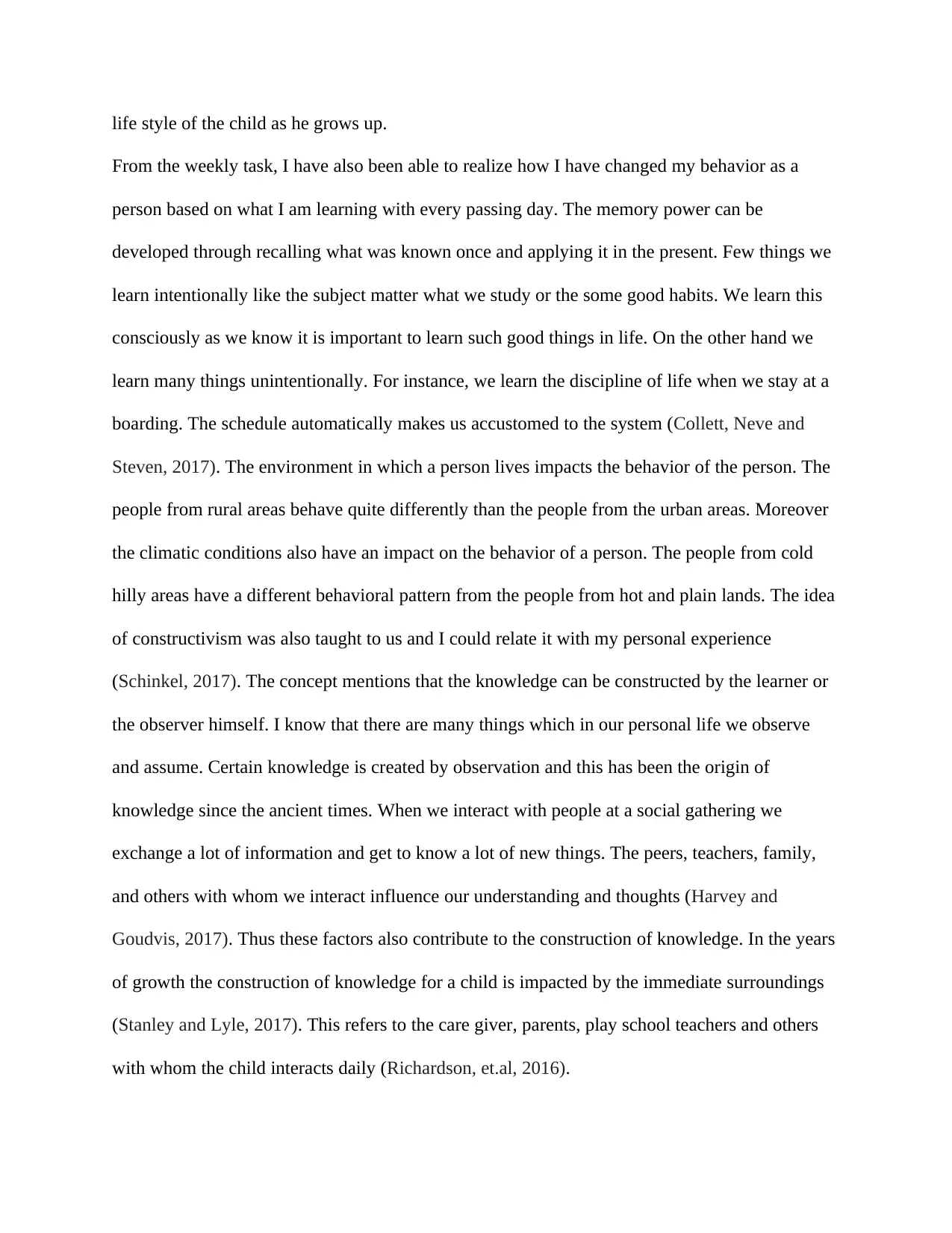
life style of the child as he grows up.
From the weekly task, I have also been able to realize how I have changed my behavior as a
person based on what I am learning with every passing day. The memory power can be
developed through recalling what was known once and applying it in the present. Few things we
learn intentionally like the subject matter what we study or the some good habits. We learn this
consciously as we know it is important to learn such good things in life. On the other hand we
learn many things unintentionally. For instance, we learn the discipline of life when we stay at a
boarding. The schedule automatically makes us accustomed to the system (Collett, Neve and
Steven, 2017). The environment in which a person lives impacts the behavior of the person. The
people from rural areas behave quite differently than the people from the urban areas. Moreover
the climatic conditions also have an impact on the behavior of a person. The people from cold
hilly areas have a different behavioral pattern from the people from hot and plain lands. The idea
of constructivism was also taught to us and I could relate it with my personal experience
(Schinkel, 2017). The concept mentions that the knowledge can be constructed by the learner or
the observer himself. I know that there are many things which in our personal life we observe
and assume. Certain knowledge is created by observation and this has been the origin of
knowledge since the ancient times. When we interact with people at a social gathering we
exchange a lot of information and get to know a lot of new things. The peers, teachers, family,
and others with whom we interact influence our understanding and thoughts (Harvey and
Goudvis, 2017). Thus these factors also contribute to the construction of knowledge. In the years
of growth the construction of knowledge for a child is impacted by the immediate surroundings
(Stanley and Lyle, 2017). This refers to the care giver, parents, play school teachers and others
with whom the child interacts daily (Richardson, et.al, 2016).
From the weekly task, I have also been able to realize how I have changed my behavior as a
person based on what I am learning with every passing day. The memory power can be
developed through recalling what was known once and applying it in the present. Few things we
learn intentionally like the subject matter what we study or the some good habits. We learn this
consciously as we know it is important to learn such good things in life. On the other hand we
learn many things unintentionally. For instance, we learn the discipline of life when we stay at a
boarding. The schedule automatically makes us accustomed to the system (Collett, Neve and
Steven, 2017). The environment in which a person lives impacts the behavior of the person. The
people from rural areas behave quite differently than the people from the urban areas. Moreover
the climatic conditions also have an impact on the behavior of a person. The people from cold
hilly areas have a different behavioral pattern from the people from hot and plain lands. The idea
of constructivism was also taught to us and I could relate it with my personal experience
(Schinkel, 2017). The concept mentions that the knowledge can be constructed by the learner or
the observer himself. I know that there are many things which in our personal life we observe
and assume. Certain knowledge is created by observation and this has been the origin of
knowledge since the ancient times. When we interact with people at a social gathering we
exchange a lot of information and get to know a lot of new things. The peers, teachers, family,
and others with whom we interact influence our understanding and thoughts (Harvey and
Goudvis, 2017). Thus these factors also contribute to the construction of knowledge. In the years
of growth the construction of knowledge for a child is impacted by the immediate surroundings
(Stanley and Lyle, 2017). This refers to the care giver, parents, play school teachers and others
with whom the child interacts daily (Richardson, et.al, 2016).
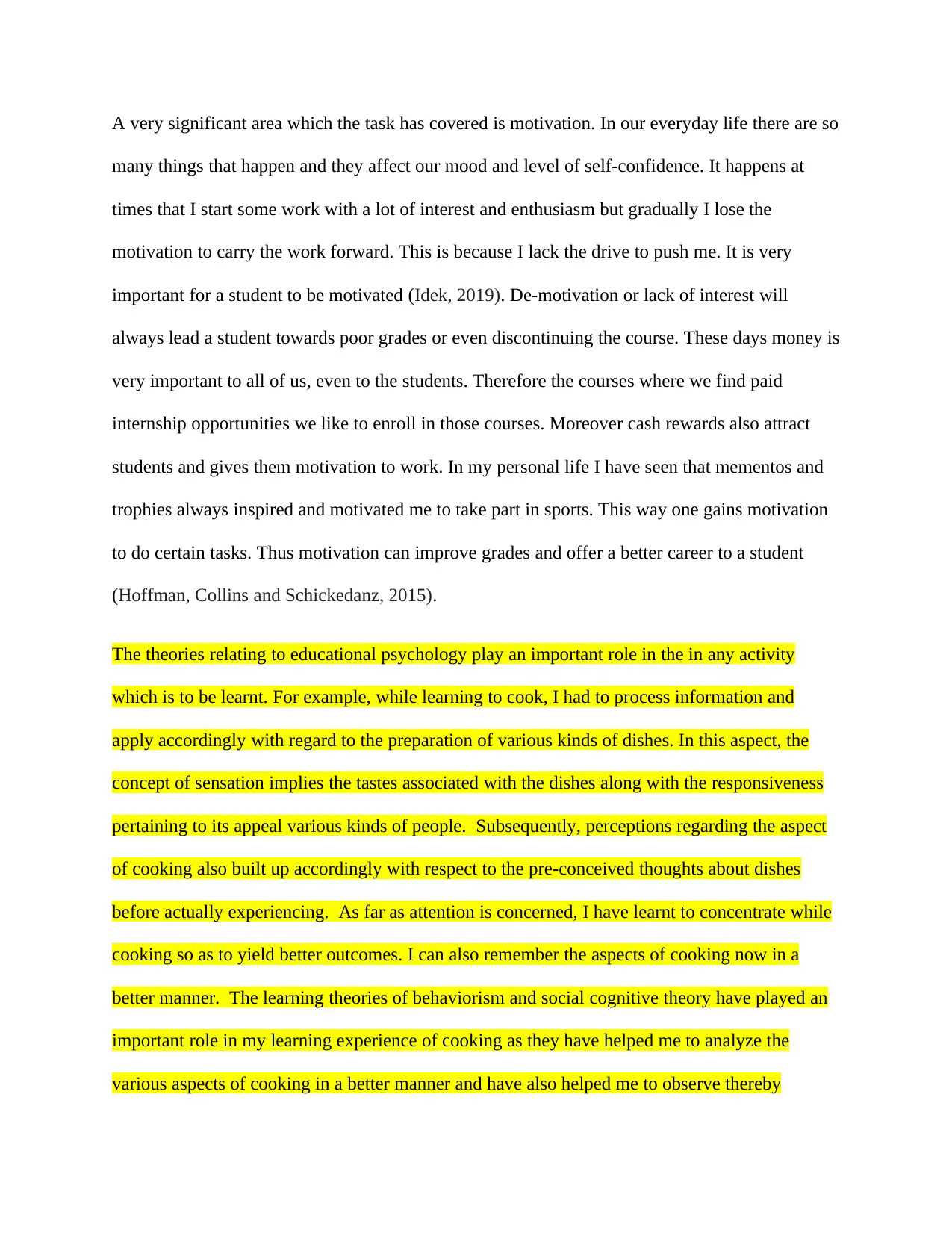
A very significant area which the task has covered is motivation. In our everyday life there are so
many things that happen and they affect our mood and level of self-confidence. It happens at
times that I start some work with a lot of interest and enthusiasm but gradually I lose the
motivation to carry the work forward. This is because I lack the drive to push me. It is very
important for a student to be motivated (Idek, 2019). De-motivation or lack of interest will
always lead a student towards poor grades or even discontinuing the course. These days money is
very important to all of us, even to the students. Therefore the courses where we find paid
internship opportunities we like to enroll in those courses. Moreover cash rewards also attract
students and gives them motivation to work. In my personal life I have seen that mementos and
trophies always inspired and motivated me to take part in sports. This way one gains motivation
to do certain tasks. Thus motivation can improve grades and offer a better career to a student
(Hoffman, Collins and Schickedanz, 2015).
The theories relating to educational psychology play an important role in the in any activity
which is to be learnt. For example, while learning to cook, I had to process information and
apply accordingly with regard to the preparation of various kinds of dishes. In this aspect, the
concept of sensation implies the tastes associated with the dishes along with the responsiveness
pertaining to its appeal various kinds of people. Subsequently, perceptions regarding the aspect
of cooking also built up accordingly with respect to the pre-conceived thoughts about dishes
before actually experiencing. As far as attention is concerned, I have learnt to concentrate while
cooking so as to yield better outcomes. I can also remember the aspects of cooking now in a
better manner. The learning theories of behaviorism and social cognitive theory have played an
important role in my learning experience of cooking as they have helped me to analyze the
various aspects of cooking in a better manner and have also helped me to observe thereby
many things that happen and they affect our mood and level of self-confidence. It happens at
times that I start some work with a lot of interest and enthusiasm but gradually I lose the
motivation to carry the work forward. This is because I lack the drive to push me. It is very
important for a student to be motivated (Idek, 2019). De-motivation or lack of interest will
always lead a student towards poor grades or even discontinuing the course. These days money is
very important to all of us, even to the students. Therefore the courses where we find paid
internship opportunities we like to enroll in those courses. Moreover cash rewards also attract
students and gives them motivation to work. In my personal life I have seen that mementos and
trophies always inspired and motivated me to take part in sports. This way one gains motivation
to do certain tasks. Thus motivation can improve grades and offer a better career to a student
(Hoffman, Collins and Schickedanz, 2015).
The theories relating to educational psychology play an important role in the in any activity
which is to be learnt. For example, while learning to cook, I had to process information and
apply accordingly with regard to the preparation of various kinds of dishes. In this aspect, the
concept of sensation implies the tastes associated with the dishes along with the responsiveness
pertaining to its appeal various kinds of people. Subsequently, perceptions regarding the aspect
of cooking also built up accordingly with respect to the pre-conceived thoughts about dishes
before actually experiencing. As far as attention is concerned, I have learnt to concentrate while
cooking so as to yield better outcomes. I can also remember the aspects of cooking now in a
better manner. The learning theories of behaviorism and social cognitive theory have played an
important role in my learning experience of cooking as they have helped me to analyze the
various aspects of cooking in a better manner and have also helped me to observe thereby
⊘ This is a preview!⊘
Do you want full access?
Subscribe today to unlock all pages.

Trusted by 1+ million students worldwide
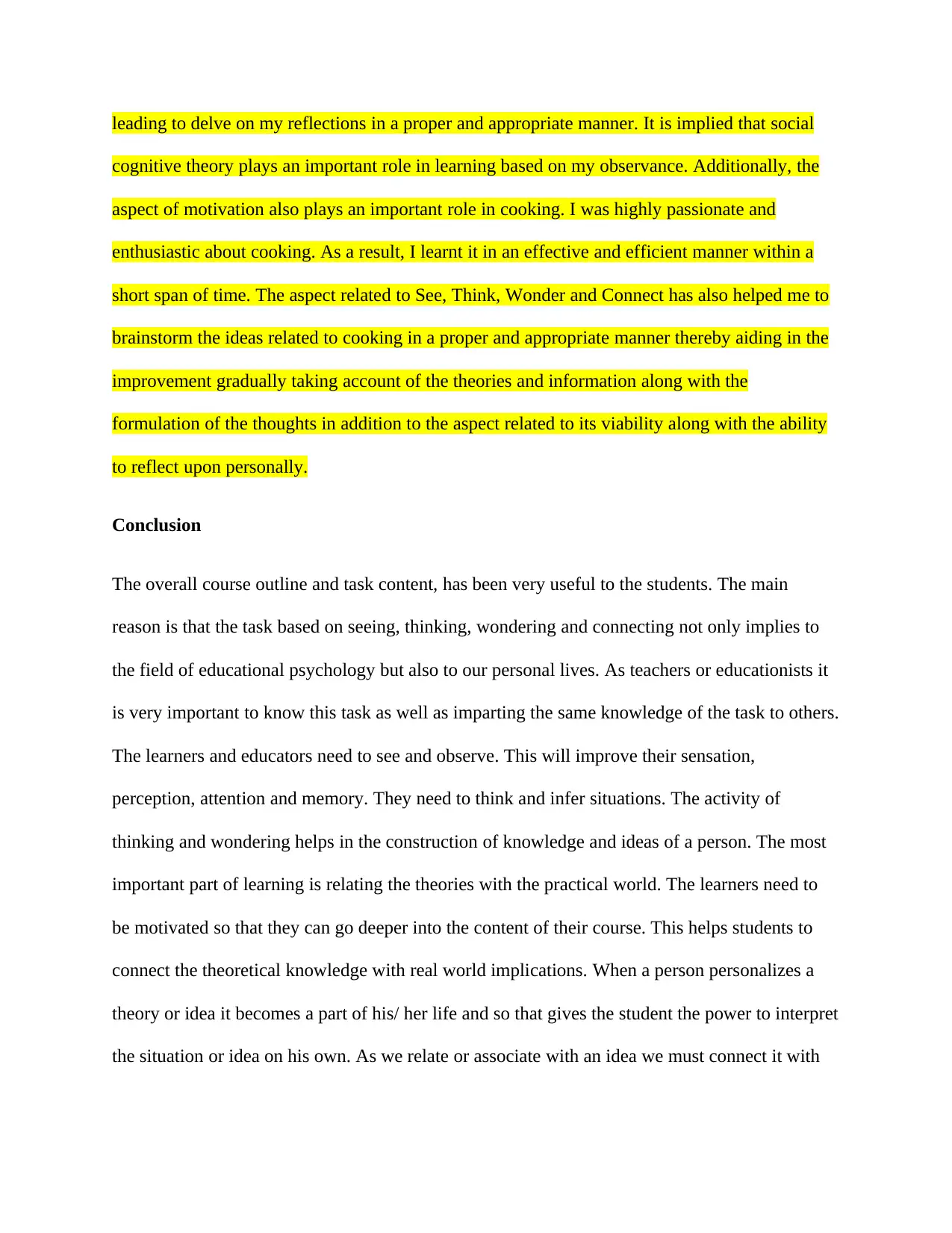
leading to delve on my reflections in a proper and appropriate manner. It is implied that social
cognitive theory plays an important role in learning based on my observance. Additionally, the
aspect of motivation also plays an important role in cooking. I was highly passionate and
enthusiastic about cooking. As a result, I learnt it in an effective and efficient manner within a
short span of time. The aspect related to See, Think, Wonder and Connect has also helped me to
brainstorm the ideas related to cooking in a proper and appropriate manner thereby aiding in the
improvement gradually taking account of the theories and information along with the
formulation of the thoughts in addition to the aspect related to its viability along with the ability
to reflect upon personally.
Conclusion
The overall course outline and task content, has been very useful to the students. The main
reason is that the task based on seeing, thinking, wondering and connecting not only implies to
the field of educational psychology but also to our personal lives. As teachers or educationists it
is very important to know this task as well as imparting the same knowledge of the task to others.
The learners and educators need to see and observe. This will improve their sensation,
perception, attention and memory. They need to think and infer situations. The activity of
thinking and wondering helps in the construction of knowledge and ideas of a person. The most
important part of learning is relating the theories with the practical world. The learners need to
be motivated so that they can go deeper into the content of their course. This helps students to
connect the theoretical knowledge with real world implications. When a person personalizes a
theory or idea it becomes a part of his/ her life and so that gives the student the power to interpret
the situation or idea on his own. As we relate or associate with an idea we must connect it with
cognitive theory plays an important role in learning based on my observance. Additionally, the
aspect of motivation also plays an important role in cooking. I was highly passionate and
enthusiastic about cooking. As a result, I learnt it in an effective and efficient manner within a
short span of time. The aspect related to See, Think, Wonder and Connect has also helped me to
brainstorm the ideas related to cooking in a proper and appropriate manner thereby aiding in the
improvement gradually taking account of the theories and information along with the
formulation of the thoughts in addition to the aspect related to its viability along with the ability
to reflect upon personally.
Conclusion
The overall course outline and task content, has been very useful to the students. The main
reason is that the task based on seeing, thinking, wondering and connecting not only implies to
the field of educational psychology but also to our personal lives. As teachers or educationists it
is very important to know this task as well as imparting the same knowledge of the task to others.
The learners and educators need to see and observe. This will improve their sensation,
perception, attention and memory. They need to think and infer situations. The activity of
thinking and wondering helps in the construction of knowledge and ideas of a person. The most
important part of learning is relating the theories with the practical world. The learners need to
be motivated so that they can go deeper into the content of their course. This helps students to
connect the theoretical knowledge with real world implications. When a person personalizes a
theory or idea it becomes a part of his/ her life and so that gives the student the power to interpret
the situation or idea on his own. As we relate or associate with an idea we must connect it with
Paraphrase This Document
Need a fresh take? Get an instant paraphrase of this document with our AI Paraphraser

our own lives as this improves our memory besides just helping us to understand the concepts
proper application.
proper application.
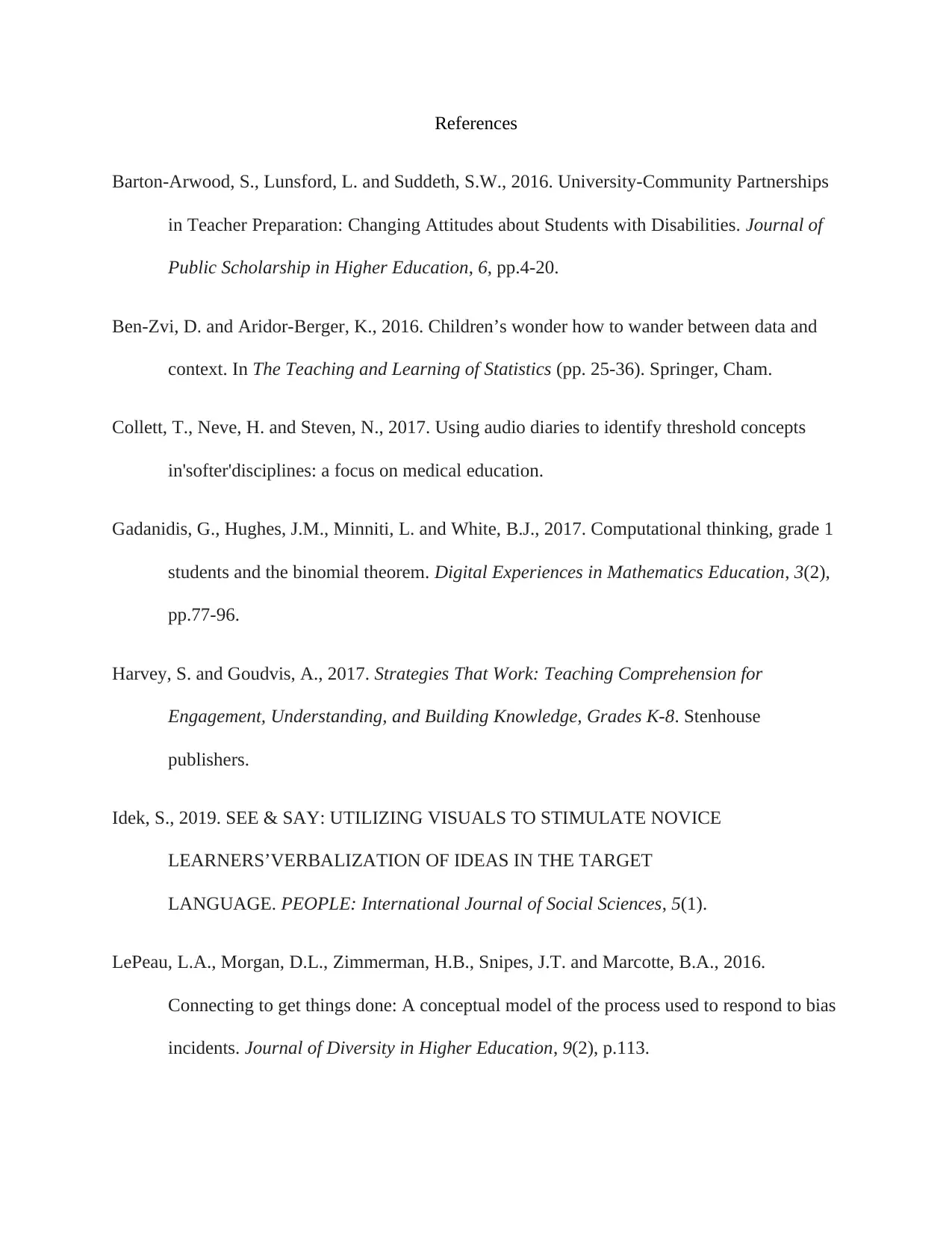
References
Barton-Arwood, S., Lunsford, L. and Suddeth, S.W., 2016. University-Community Partnerships
in Teacher Preparation: Changing Attitudes about Students with Disabilities. Journal of
Public Scholarship in Higher Education, 6, pp.4-20.
Ben-Zvi, D. and Aridor-Berger, K., 2016. Children’s wonder how to wander between data and
context. In The Teaching and Learning of Statistics (pp. 25-36). Springer, Cham.
Collett, T., Neve, H. and Steven, N., 2017. Using audio diaries to identify threshold concepts
in'softer'disciplines: a focus on medical education.
Gadanidis, G., Hughes, J.M., Minniti, L. and White, B.J., 2017. Computational thinking, grade 1
students and the binomial theorem. Digital Experiences in Mathematics Education, 3(2),
pp.77-96.
Harvey, S. and Goudvis, A., 2017. Strategies That Work: Teaching Comprehension for
Engagement, Understanding, and Building Knowledge, Grades K-8. Stenhouse
publishers.
Idek, S., 2019. SEE & SAY: UTILIZING VISUALS TO STIMULATE NOVICE
LEARNERS’VERBALIZATION OF IDEAS IN THE TARGET
LANGUAGE. PEOPLE: International Journal of Social Sciences, 5(1).
LePeau, L.A., Morgan, D.L., Zimmerman, H.B., Snipes, J.T. and Marcotte, B.A., 2016.
Connecting to get things done: A conceptual model of the process used to respond to bias
incidents. Journal of Diversity in Higher Education, 9(2), p.113.
Barton-Arwood, S., Lunsford, L. and Suddeth, S.W., 2016. University-Community Partnerships
in Teacher Preparation: Changing Attitudes about Students with Disabilities. Journal of
Public Scholarship in Higher Education, 6, pp.4-20.
Ben-Zvi, D. and Aridor-Berger, K., 2016. Children’s wonder how to wander between data and
context. In The Teaching and Learning of Statistics (pp. 25-36). Springer, Cham.
Collett, T., Neve, H. and Steven, N., 2017. Using audio diaries to identify threshold concepts
in'softer'disciplines: a focus on medical education.
Gadanidis, G., Hughes, J.M., Minniti, L. and White, B.J., 2017. Computational thinking, grade 1
students and the binomial theorem. Digital Experiences in Mathematics Education, 3(2),
pp.77-96.
Harvey, S. and Goudvis, A., 2017. Strategies That Work: Teaching Comprehension for
Engagement, Understanding, and Building Knowledge, Grades K-8. Stenhouse
publishers.
Idek, S., 2019. SEE & SAY: UTILIZING VISUALS TO STIMULATE NOVICE
LEARNERS’VERBALIZATION OF IDEAS IN THE TARGET
LANGUAGE. PEOPLE: International Journal of Social Sciences, 5(1).
LePeau, L.A., Morgan, D.L., Zimmerman, H.B., Snipes, J.T. and Marcotte, B.A., 2016.
Connecting to get things done: A conceptual model of the process used to respond to bias
incidents. Journal of Diversity in Higher Education, 9(2), p.113.
⊘ This is a preview!⊘
Do you want full access?
Subscribe today to unlock all pages.

Trusted by 1+ million students worldwide
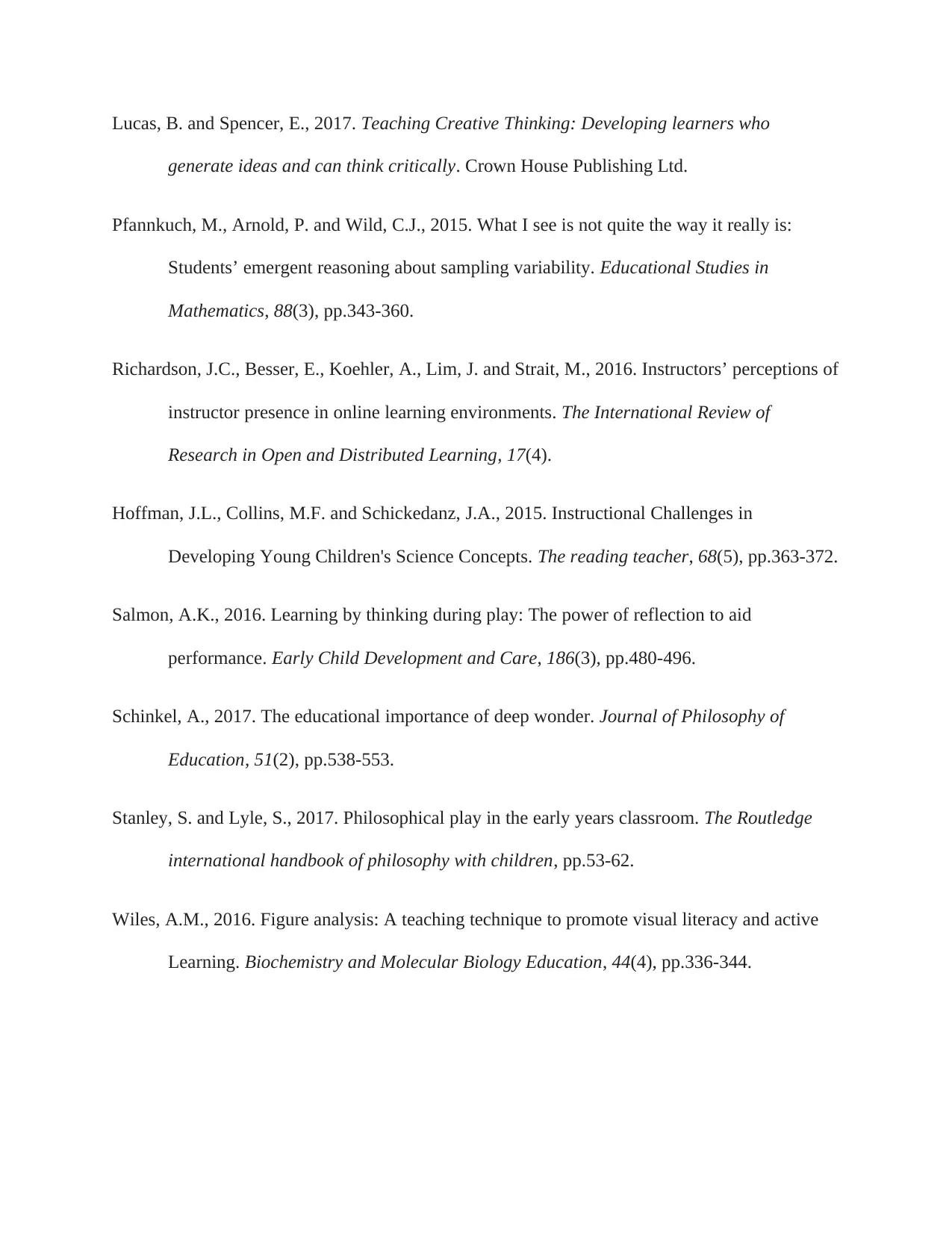
Lucas, B. and Spencer, E., 2017. Teaching Creative Thinking: Developing learners who
generate ideas and can think critically. Crown House Publishing Ltd.
Pfannkuch, M., Arnold, P. and Wild, C.J., 2015. What I see is not quite the way it really is:
Students’ emergent reasoning about sampling variability. Educational Studies in
Mathematics, 88(3), pp.343-360.
Richardson, J.C., Besser, E., Koehler, A., Lim, J. and Strait, M., 2016. Instructors’ perceptions of
instructor presence in online learning environments. The International Review of
Research in Open and Distributed Learning, 17(4).
Hoffman, J.L., Collins, M.F. and Schickedanz, J.A., 2015. Instructional Challenges in
Developing Young Children's Science Concepts. The reading teacher, 68(5), pp.363-372.
Salmon, A.K., 2016. Learning by thinking during play: The power of reflection to aid
performance. Early Child Development and Care, 186(3), pp.480-496.
Schinkel, A., 2017. The educational importance of deep wonder. Journal of Philosophy of
Education, 51(2), pp.538-553.
Stanley, S. and Lyle, S., 2017. Philosophical play in the early years classroom. The Routledge
international handbook of philosophy with children, pp.53-62.
Wiles, A.M., 2016. Figure analysis: A teaching technique to promote visual literacy and active
Learning. Biochemistry and Molecular Biology Education, 44(4), pp.336-344.
generate ideas and can think critically. Crown House Publishing Ltd.
Pfannkuch, M., Arnold, P. and Wild, C.J., 2015. What I see is not quite the way it really is:
Students’ emergent reasoning about sampling variability. Educational Studies in
Mathematics, 88(3), pp.343-360.
Richardson, J.C., Besser, E., Koehler, A., Lim, J. and Strait, M., 2016. Instructors’ perceptions of
instructor presence in online learning environments. The International Review of
Research in Open and Distributed Learning, 17(4).
Hoffman, J.L., Collins, M.F. and Schickedanz, J.A., 2015. Instructional Challenges in
Developing Young Children's Science Concepts. The reading teacher, 68(5), pp.363-372.
Salmon, A.K., 2016. Learning by thinking during play: The power of reflection to aid
performance. Early Child Development and Care, 186(3), pp.480-496.
Schinkel, A., 2017. The educational importance of deep wonder. Journal of Philosophy of
Education, 51(2), pp.538-553.
Stanley, S. and Lyle, S., 2017. Philosophical play in the early years classroom. The Routledge
international handbook of philosophy with children, pp.53-62.
Wiles, A.M., 2016. Figure analysis: A teaching technique to promote visual literacy and active
Learning. Biochemistry and Molecular Biology Education, 44(4), pp.336-344.
1 out of 10
Related Documents
Your All-in-One AI-Powered Toolkit for Academic Success.
+13062052269
info@desklib.com
Available 24*7 on WhatsApp / Email
![[object Object]](/_next/static/media/star-bottom.7253800d.svg)
Unlock your academic potential
Copyright © 2020–2026 A2Z Services. All Rights Reserved. Developed and managed by ZUCOL.





